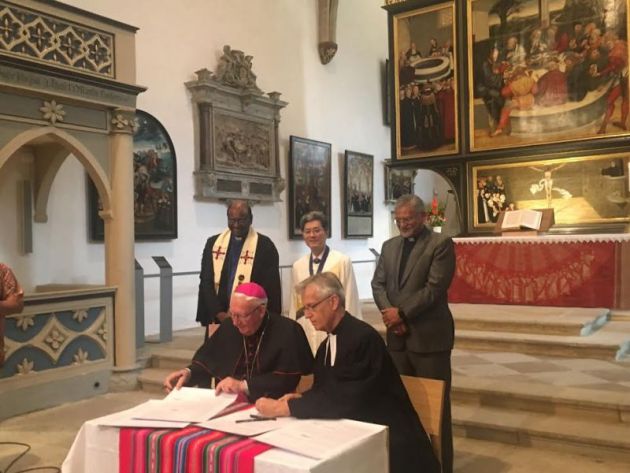Pope Francis hails declaration signed at Reformed churches gathering in Germany

Wittenberg, Germany - Pope Francis has hailed the signing of declarations by the World Council of Reformed Churches joining Lutherans, Methodists and the Catholic Church to affirm their basic understanding of the Gospel in the quest for greater church unity.
"Together with great joy, today's formal act bring new challenges and responsibilities in our pursuit of fidelity to the Gospel and unity in truth," the Pope said in message read out for him.
"May it mark a new stage of fellowship and cooperation in the service of justice and peace in our human family," said Francis.
The Pope's message was read to a congregation of about 800 Reformed clergy and lay people from all over the world and dignitaries representing the main Christian Churches, gathered in Wittenberg.
The town in the eastern part of Germany is where the 16th century Reformer Martin Luther lived and worked and set in motion the Reformation 500 years ago when he posted his 95 theses to a church door there protesting about corruption in the Catholic Church at the time.
Before reading the Pope's statement Cardinal Brian Farrell, Secretary of the Pontifical Council for Promoting Christian Unity told the congregation the signing of the agreement has opened "a new era of trust between the churches – a time for healing and reconciliation and rediscovering how much we share."
The World Council of Churches also welcomed the signing of the two ecumenical statements by the World Communion of Reformed Churches in which it seeks to overcome divisions of the past and to work with other Christian communions for unity and common witness.
The WCRC represents about eighty million Reformed tradition Christians and was gathered in the City Church, the Stadtkirche of Wittenberg where it signed an Association Agreement joining the Joint Declaration of Justification(JDDJ).
It was originally signed in 1999 between the Lutherans and the Catholics in the German city of Augsburg bringing to an end nearly five centuries of religious wars in the Western Church. The JDDJ was joined by the World Methodist Council in 2006.
The chairperson of the Protestant Churches in Germany, bishop Heinrich Bedford Strohm told the congregation that the JDDJ signed in 1999 was a strong witness for overcoming divisions in the Western Churches.
A second document called the Wittenberg Witness was signed between the WCRC and the Lutheran World Federation affirming closer cooperation and renewal between the two church bodies in the 500th Reformation Year and stating further "Together we commit ourselves more visible unity".
LWF General Secretary Rev. Martin Junge signed for the global Lutheran communion of 145 churches and WCRC General Secretary Rev. Chris Ferguson signed for the Reformed Communion, which counts over 225 churches as members.
The ecumenical service in the church where Martin Luther once preached was led by Rev. Najla Kassab Abousawan from the National Evangelical Synod of Syria and Lebanon.
"Here I stand, A Middle Eastern women on the Pulpit of Luther, if Just Luther imagined that, this could have been his 96th question to the church. Not why there is a women in this pulpit, but why did take this long?" she said to laughter and applause from the congregation.
The LWF's Junge said afterwards, "Today was a day when we didn't get stuck in the past but opened ourselves up to the future."
Jerry Pillay the president of the WCRC noted, "Today is a historic day...We can take our Reformed Lutheran dialogue and make it visible." He added "we no longer had to be divided we realized we have more in common than divide us."
CHURCH LEADERS FROM GLOBAL SOUTH
At a press conference one question centered on the fact that so many of the current church leadership comes from the Global South and if this accounts for the speed of the ecumenical movement and whether there is a change in the balance of power with churches from the Global South getting a greater voice.
Pillay who is South African said, "We are rapidly easing in our space and motion in terms of feeling the impact of the Global South particularly.
"If you look at our General Council taking place in Leipzig now and how our views are challenged... and we are pressed for renewal in terms of theology and mission and spirituality, justice and ecumenical engagement...
"We have a new set of impact on Christian beliefs and a center challenges Western theology and believes and practice. So we are seen a rapid change.
"People are looking for change and we are moving with a speed and it is the people who are bringing that to us. ....and it is fast having its impact in the way we understand things and perceive ourselves. It is also not incongruent with we are.
"For a long while we did not understood that but now that we are creating more space and creating more space for different voices we are starting to embrace that impact."
Pillay talked about the consensus model they are using at the General Council and says "This concept also emerges in an African form of Ubuntu – I am because you are." And we are trying to understand that and it impacts on all of us so that we understand what it means to be human beings together."
With Pope Francis hailing from Argentine, Pillay from South Africa, the general secretary of the LWF Martin Junge from Chile and the General Secretary of the World Methodist Council, Ivan Abrahams also from South Africa – church leaders from the Global South have gained more prominence in recent years.